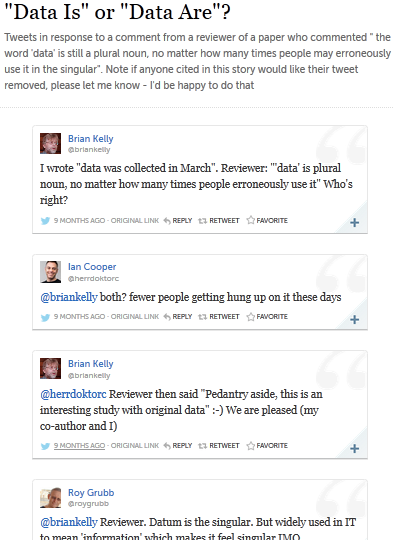Is “Why every researcher should sign up for their ORCID ID” Grammatically Incorrect?
 Yesterday a post of mine entitled “Why every researcher should sign up for their ORCID ID” was republished on the LSE Impact of Social Sciences blog. The announcement made by @lseimpactblog was subsequently widely retweeted, as illustrated.
Yesterday a post of mine entitled “Why every researcher should sign up for their ORCID ID” was republished on the LSE Impact of Social Sciences blog. The announcement made by @lseimpactblog was subsequently widely retweeted, as illustrated.
It was subsequently pointed out the sentence contained a grammatical error: “every researcher” is singular and therefore shouldn’t be followed by a plural form of the pronoun: “their ORCID ID“. Coincidentally yesterday I came across as tweet which linked to the announcement that “The [University of Washington] Daily adopts gender-neutral pronoun“. I responded to the tweet questioning whether this was a wise decision:
Univ of WA adopts gender neutral pronouns – they as singular pronoun: ow.ly/hgwD6 Surely a thumbs down?
In response it seems that several people were in agreement with the decision taken at the University of Washington that “The Daily will join the efforts of these organizations by implementing gender-neutral language, using “they” as a singular pronoun when applicable“. I received several responses shortly after publishing my tweet:
- It was good enough for Jane Austen! :)
- Meh. It’s been around since at least 1595 – better than ubiquitous ‘he’, generally less clumsy than ‘he/she’, so why not?
- I use ‘they’ as a gender neutral pronoun. Better than s/he surely?
- why? I can live with it for the sake of less gendered conversations (and have been doing it for years anyway)
However one person made the point that:
- I really HATE the use of “they” as a singular pronoun!
I would agree with the view that “Why every researcher should sign up for his/her ORCID ID” is ugly. I also feel that “Why every researcher should sign up for his ORCID ID” is sexist and “Why every researcher should sign up for her ORCID ID” seeks to make a political point which, although I might be sympathetic towards, will distract from the purpose of the sentence.
In light of the comments and subsequent discussion on Twitter this morning I now realise that I agree that this construct is now acceptable. However as a comment made on the English StackExchange forum put it:
It’s not ungrammatical per se on the basis of analysis of actual usage using reasonable linguistic methods. But use it at your own risk of being criticized by the self-righteous but misinformed.
The question seems to no longer a question of one’s understanding correct and incorrect language use but one’s willingness to potentially alienate the “self-righteous but misinformed“. And note that before anyone suggests that there is no such things as incorrect language use I’ll highlight a tweet I saw this morning which provided an ironical perspective on language misuse:
Somewhere, someone who writes “should of” instead of “should have” gets paid more than me.
The particular example discussed in this post clearly has ‘political’ connotations as one form which was popular in the past makes 50% of the population invisible (it was interesting to observe, y the way, that 4 of the 5 initial responses were from women). It would be possible to sidestep such controversy by restructuring the sentence e.g. “Why all researcher should sign up for an ORCID ID” or “Why all researchers should sign up for their ORCID ID“. But what about the more general question regarding changing rules of grammar?
“Data Is” or “Data Are”?
 As recorded in a Storify summary of the subsequent Twitter discussion, last year a reviewer of a paper which asked “Can Linkedin and Academia.edu Enhance Access to Open Repositories?” commented that:
As recorded in a Storify summary of the subsequent Twitter discussion, last year a reviewer of a paper which asked “Can Linkedin and Academia.edu Enhance Access to Open Repositories?” commented that:
“the word ‘data’ is still a plural noun, no matter how many times people may erroneously use it in the singular“
Myself and my co-author Jenny Delasalle disagreed and the paper was published containing the sentence:
As described by Delasalle [8] the data for Academia.edu was obtained by entering the institution’s name in the search box; the number of entries were then displayed
But what if reviewers or editors insist that text must conform with specific house rules in order for a submitted article to be published? Should one’s approach to writing and grammar be based on one’s own views on what is appropriate or on what may be appropriate for the readers? And if that latter, whose opinions should one prioritise: the editors and reviewers or general readers?
It seems to me that it can be helpful to gauge opinion on such matters. I have therefore set up two surveys to solicit views on whether the following grammatical constructs are felt to be appropriate in scholarly works: “Anyone who loves the English language should have a copy of this book in their bookcase” and (b) “The data was obtained from an online survey“.
I invite responses to the survey and comments on this topic.
View Twitter conversation from: [Topsy] | View Twitter statistics from: [TweetReach] – [Bit.ly]




You must be logged in to post a comment.